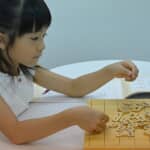Shogi 3 October 2017
Working Moms’ Conversation – “Moms, Children, and Shogi …and Fathers?”
Shogi has recently caught on again in Japan thanks to a 14-year-old schoolboy, Sota Fuji, who is a Professional Shogi player with the rank of fourth Dan. I assume that inspired by his historic achievement, more mothers want their children to learn Shogi.
Since Shogi has been not so popular among women, however, moms may be wondering if they can help their children to play Shogi. They might not be even sure if Shogi is actually fun.
Responding to their concern, I-tsu-tsu members got together to talk about “Shogi and children.” The members were all mothers with children who learn Shoji: Akiko Nakakura with three children, Hisae Ozaki with two children, and Yuka Okuda with three children. The facilitator was me, Nae Kanamoto.
They talked about how their children and their family had changed and what kind of concerns they had after children started to learn Shogi. Their conversation would provide useful information, sharing answers to common questions or concerns about Shogi that mothers would have.
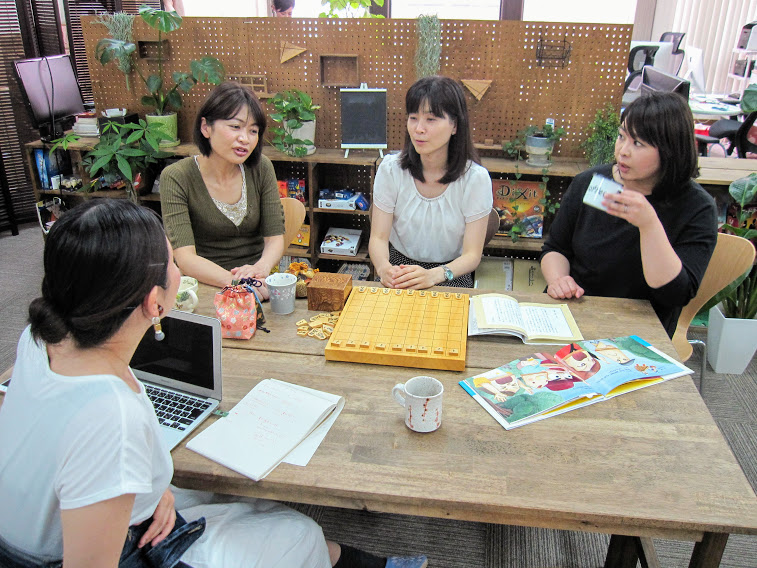
The most delighted one might be Dad?
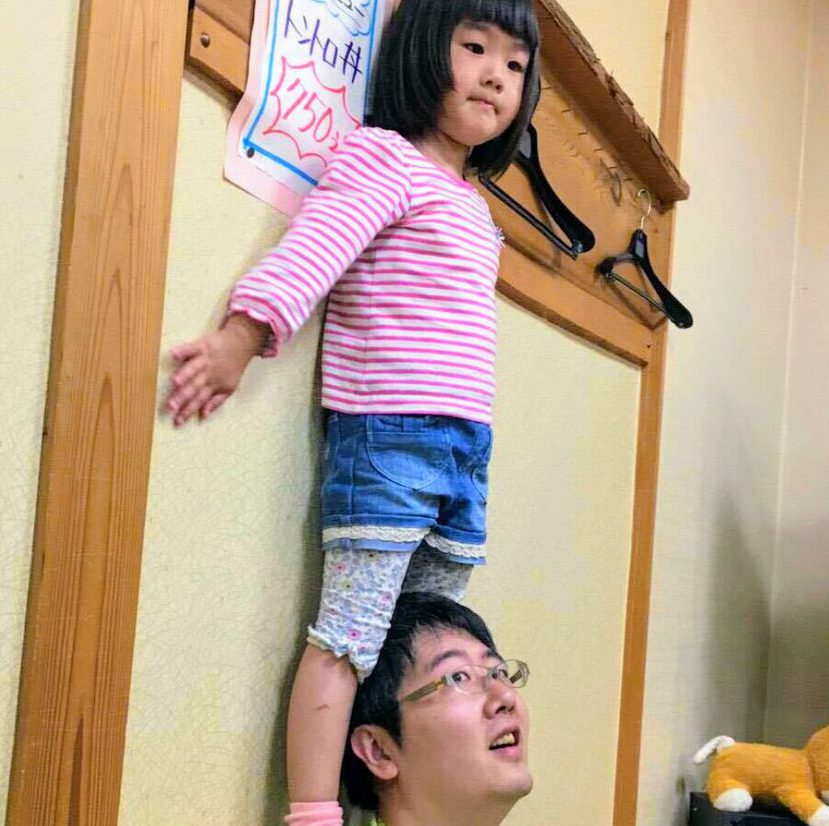
Nae: Can you tell us about your children and their level in Shogi?
Akiko: I have three children. The eldest is a girl who can play a game with basic knowledge about piece movements. The second one is also a girl who plays Shogi just for fun. And the youngest is a boy who has got hooked on Shogi. He asks me to play with him every day.
Hisae: I have two daughters. The younger one has been enjoying Shogi for several years. Usually she practices Shogi with textbooks、but she says that she wants to take Shogi classes sometime future.
Yuka: Both of my girls have just started to learn Shogi. They attended pre-class trial lessons at I-tsu-tsu. They said that they had a really good time during the class. The elder tried to solve problems right after she came back home from the class, and the younger had a dream about Shogi at that night.
Nae: Did she?
Yuka: During the lesson, she couldn’t find the way to move Kin (Gold), but the next morning, she got up and said, “Mom, I know how to move Kin. It can move here and there, and it will have a tail!” and so on. She started to explain how to move Kin based on what she dreamed.
Nae: I can tell how much they enjoyed the class! Have you seen any change in your children or family since they started Shoji?
Yuka: First of all, their Dad seems to be very happy. “How were the girls at the class?” “Did you shoot a video?”, he asked me at the end of his tough day, when the children had their first class. He was very curious about the children, which is not always the case. He even started to make Shogi puzzles.
Akiko & Hisae: Ditto!
Akiko: My husband watches TV Shogi programs because of his job. Children often cut in, and ask him about anything that they can’t understand. He seems to be very happy to be asked about Shogi, saying “Things are not so easy with Shogi!”.
Hisae: That happens in our family, too. I think fathers tend to feel happy when their daughters start to play Shogi, since it might be usually a bit difficult for fathers to have something in common with their daughters. Girls like to play with dolls or play house, but these are usually not what fathers are good at. Through Shogi, fathers can keep their dignity and enjoy spending time with their daughters.
Yuka: Actually, I had regarded Shogi as something for boys before, and had never thought about putting Shogi on the list of lessons or hobbies that my children would enjoy. After I got a job at I-tsu-tsu, my daughters showed their interests in Shoji, which surprised me and my husband.
Hisae: In my case, my friend’s daughter was enjoying Shogi and I got inspired to let my daughters play it. I think without her and her daughter, my daughters wouldn’t have encountered Shogi.
Nae: Indeed, there is a fixed image about Shogi as things for grandpas. This image might have been made by TV or something.
Akiko: If girls see more women enjoy paying Shogi, it would be more natural for them to get interested in Shogi. If their mothers are not familiar with Shogi, it would be nice if their fathers can support them.
Nae: I think it is wonderful if parents enjoy Shogi together. Why don’t you play a game with your husband after taking a bath or anytime?
All: Never!
Shogi among siblings
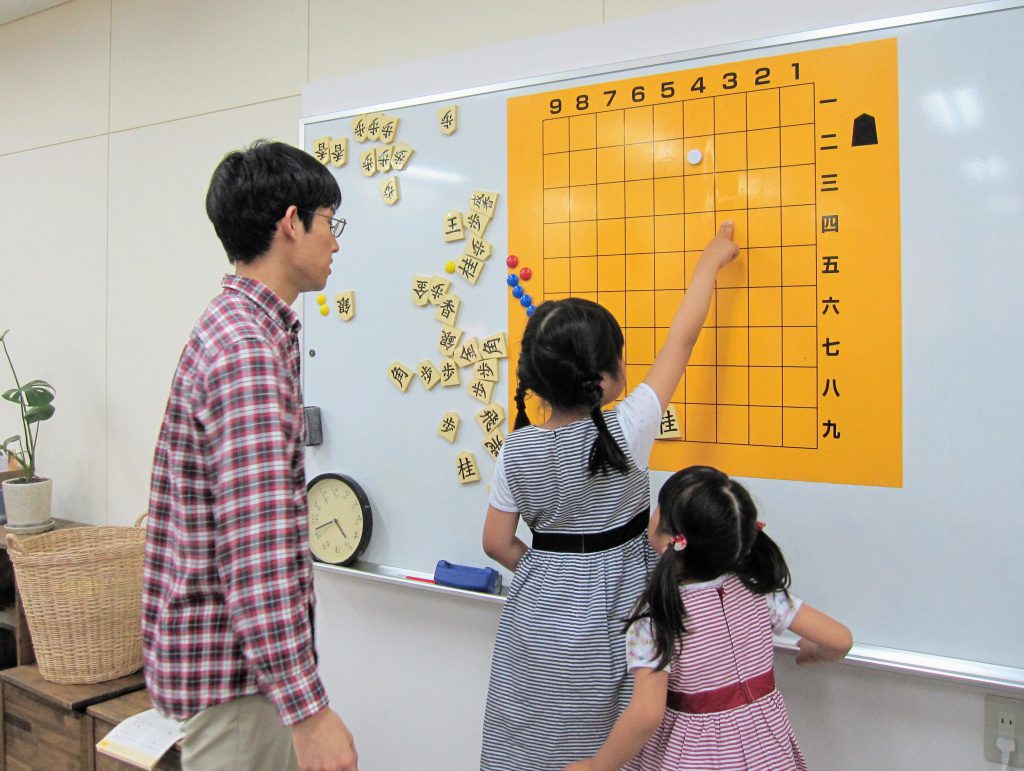
Nae: How do your children feel about Shogi?
Yuka: My elder daughter has just started to play Shogi, as I mentioned before. She enjoys studying Shogi very much with textbooks. She is not good at playing sports, but she seems happy to find something she can be good at outside sports.
Nae: How about the younger one?
Yuka: She has not mastered Shogi rules yet, but she likes a Shogi picture book very much and is learning how to move pieces associated with characters in the book.
Hisae: My younger daughter is stronger than her big sister now. The younger one was playing Shogi with her father the other day and sometime later he got things to do. The elder one took over him and the younger turned the game around and won. The elder one became in a bad mood, and since then she has hardly ever played Shogi.
Nae: I have been there. My big brother used to thrash me in swimming races. He was always faster than me and I lost my interest in swimming. Siblings can be good rivals, but at the same time, it can be hard for them if there is a big gap in their talent or abilities.
Akiko: I have been playing Shogi with my younger sister since our childhood. We have been more like good peers rather than rivals. We had a family rule, so to speak, which forced us not to go out until we solved mate problems. We worked as a team to solve problems so that we could finish our tasks as fast as possible. We also worked together to beat boys at Shogi dojo.
Nae: Were there any ability differences between you and your sister?
Akiko: Not much. We took the lead alternately in several competitive situations. Fortunately, competition drove us to achieve more.
Hisae: It sounds that you and your sister worked together and learned from each other. By the way, what do you think can help my elder daughter interested in Shogi again? With Shogi, we have to have a black and white result. I think it is perfectly okay for my children to lose a game. Since I don’t know much about Shogi, however, it’s difficult for me to encourage and compliment my daughters on something not related to winning or losing. I also feel that it is difficult to help them maintain their motivation.
Akiko: The same thing happened to my elder daughter. After she started to play Shogi, she couldn’t feel her own progress for a while, and lost her interest in it. At the very beginning, you are likely to lose games a lot and go through tough time. What changed her situation was her brother’s passion for Shogi. Seeing her brother having so much fun with Shogi, she started playing again. I think it’s a good idea to help children realize how enjoyable and fun Shogi is.
Hisae: Absolutely, happy smile speaks louder than words!
Children, Mom, and Shogi
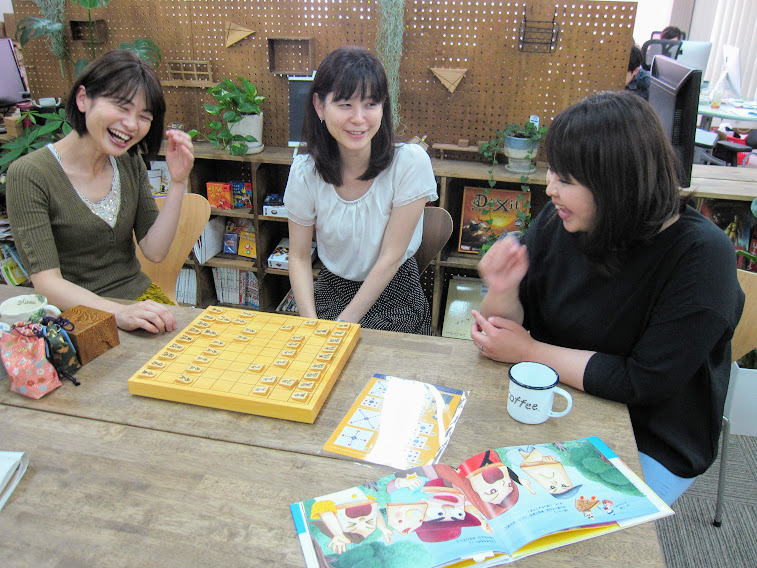
Yuka: Do you think moms should play Shogi?
Akiko: I would not say it is necessary, but as you know, if you have certain amount of knowledge about Shogi, like basic rules and the way to move pieces, you can give your children more meaningful advice or comment. For example, you will be able to praise your children on something in details other than just a game result. Or, your future dream could be to play Shogi with your children. One thing you need to remember is that mom and children can get too close.
Nae: What do you mean by that?
Akiko: They would become selfish and ask too much of each other. Children would get grumpy, losing a game. Parents would say something they shouldn’t mention.
Hisae & Yuka: It is the case with anything besides Shogi.
Nae: Putting aside mom’s Shogi knowledge, do you think it is important for children to have a chance to play Shogi with others?
Akiko: Even though Shogi apps are available for children as a tool to play Shogi, they can learn more by playing a with other people. Children get more disappointed when defeated by a person than by software. It would also be a nice experience for them to see others play a game.
Hisae: My younger daughter is now practicing Shogi only with textbooks, and hopes to go to a Shogi class nearby, if there is any available. Unfortunately, my neighborhood doesn’t have good ones.
Akiko: Indeed, Shogi classes are not very popular currently. But, things are changing. There are more and more cozy and friendly Shogi classes.
Incidentally, I have been enjoying going on a Shogi date with my son.
Hisae: In my case, my husband has a privilege of being our daughters’ date.
Yuka: Same with me!
(end of the conversation)
How was the First Moms’ Conversation presented by I-tsu-tsu? Moms who attended this meeting gave me feedbacks on this, saying that they found many through the conversation. Did you get something new from that?
Moms strongly support children who play Shogi, despite their concerns and uncertainties. This is my impression, as a postscript.
Relating topic is discussed below:

